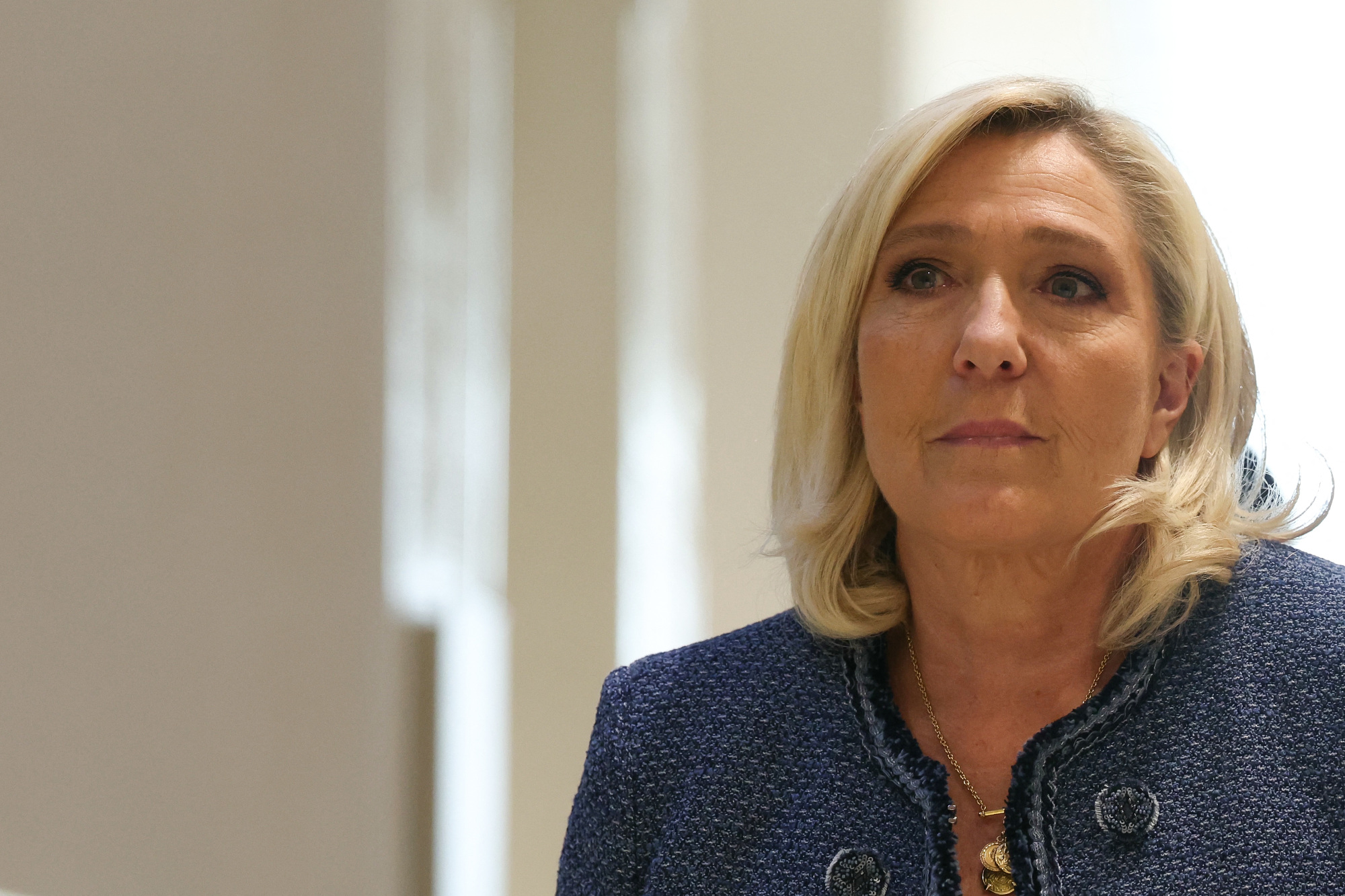Marine Le Pen is fighting back, launching an all-out counterattack against a Paris court’s decision to suspend her from politics. ‘We won’t let the French people’s election be stolen,’ she declared at an RN meeting the morning after her conviction, calling the ruling a ‘nuclear bomb’ dropped because ‘we’re about to win’ the presidency. Time, though, is her real enemy. The presidential election’s first round is set for April 2027, with candidates due to declare by early January. Le Pen has just 21 months to overturn her conviction, but French criminal appeals typically take 18 to 24 months – too long unless the court fast-tracks it or it’s scheduled with political urgency. Her strategy now hinges on reversing the ruling, speeding up the process, and rewriting the narrative – or the law itself.
Le Pen arrived in court yesterday looking confident – chatting with lawyers, shaking hands. But she left visibly shaken, walking out before the judge had even finished reading the verdict. She didn’t speak a word, heading straight to Rassemblement National headquarters, where she spent the afternoon with her legal team and senior strategists. By 8 p.m., she was on TF1 – France’s main evening news – composed and focused. Her message was clear: this is not over. The appearance marked the start of her counteroffensive.
Le Pen’s conviction has drawn sharp reactions abroad, particularly on the right. Italy’s Matteo Salvini called it ‘a declaration of war by Brussels’. Hungary’s Viktor Orbán tweeted ‘Je suis Marine!’ in solidarity, while Kremlin spokesman Dmitry Peskov condemned what he called a crackdown on democratic opposition in Europe. Geert Wilders of the Netherlands predicted she’d still triumph. Elon Musk, slamming the verdict, warned on X that ‘when the radical left can’t win via democratic vote, they abuse the legal system to jail their opponents,’ predicting it would ‘backfire.’ Donald Trump, echoing his own legal battles, called it a ‘very big deal,’ telling reporters, ‘She was the leading candidate… That sounds very much like this country.’
Le Pen is appealing the decision, which was handed down by the Paris criminal tribunal – the lowest tier of the French judiciary. The case now moves to the Court of Appeal, where her team will seek to overturn both the conviction itself and the penalty of ineligibility.
Le Pen will argue first that the misappropriation charge itself is questionable. Le Pen was convicted of using European Parliament funds to pay party staff – a practice widely acknowledged as common in Brussels. The court found no personal enrichment: the money went to party work. The defence contends that the line between parliamentary and political work is inherently blurry for any elected official – particularly in a body like the European Parliament, where national politics and European mandates are tightly interwoven. In short, her team says she is being punished for doing what everyone in Brussels has always done – and under a law that should never have been applied in the first place.
Second, Le Pen will argue that the law used to bar her from office – the loi Sapin II– should not apply retroactively. The misconduct for which she’s been convicted dates from 2004 to 2016. But the provision of the Sapin II Act that allows judges to impose immediate ineligibility for financial offences only came into force in 2017. Le Pen’s legal team will argue that applying it retroactively violates the principle that harsher penalties cannot be imposed for past conduct.
Knowing that the standard timeline won’t work in her favour, Le Pen is now pressing for the appeal to be heard as quickly as possible. In her television appearance, she made a direct appeal to the judiciary, urging the courts to ‘assume their responsibility’ and accelerate the process. The move is as much political as legal: she is positioning herself as respectful of due process but also determined to have her name cleared in time to give voters a real choice.
Fast-tracking a criminal appeal in France is not without precedent, but it’s rare and discretionary. It would require the Paris Court of Appeal to assign the case to an expedited docket, shorten procedural delays, and potentially condense the calendar for written submissions and oral hearings. The court is under no obligation to do so. And even if it agrees, the case must still pass through the Court of Cassation if further appeal is lodged – which adds another layer of uncertainty.
The government, for its part, appears keen to neutralise the perception of judicial delay. During questions in the National Assembly on Tuesday afternoon, Justice Minister Gérald Darmanin stated that he personally hoped Le Pen’s appeal could be heard ‘within the most reasonable timeframe possible.’ He noted that the Paris Court of Appeal is ‘perfectly independent’ – but made clear the government wants to avoid delays that could feed Le Pen’s narrative.
Later that evening, the Paris Court of Appeal issued a statement saying it would examine the case ‘within a timeframe that should allow a decision by summer 2026.’ That would give Le Pen several months’ margin before the January deadline – but only if everything stays on schedule. The court gave no firm commitment, and the verdict would still be subject to further appeal. The timing problem has narrowed. It hasn’t gone away.
For now, Le Pen’s strategy is to force the timetable onto the political agenda. By making the calendar itself part of the injustice, she can argue that the delay is a threat to democracy. If the system takes too long to review her case, she can claim the judiciary has de facto deprived the electorate of a free and fair choice, regardless of the legal outcome.
Prime Minister François Bayrou voiced full support for the magistrates whom he said had been receiving threats. Macron himself has been completely silent, his government sticking to the position that it cannot comment on a court ruling.
Le Pen, meanwhile, accused the judiciary of political interference, claiming the presiding judge had explicitly said her candidacy would cause a disturbance to public order. That, Le Pen argued, was an admission that the point of the ruling was to block her from winning the presidency.
She accused the courts of bypassing the fundamental principle of the right to appeal – and condemned the sentence as an authoritarian tactic. ‘Where else does a first-instance judge get to override the electorate?’ she asked, comparing her situation to the disqualification of the top presidential contender in Romania, and the imprisonment of Erdoğan’s political opponent in Turkey. She also called out the Syndicat de la Magistrature, the left leaning magistrates’ union, for its past official statements stating that the RN must be stopped from gaining power. ‘This isn’t justice,’ she said. ‘It’s politics, and the magistrate said so herself.’
Some have suggested Macron could issue a presidential pardon – a power granted by the French Constitution – to lift Le Pen’s ban and let her run. She’s already rejected it outright. ‘No and no again,’ she declared on TF1, refusing to rely on her rival’s mercy while her appeal is alive. There’s been no word from Macron on the idea, leaving her defiance to stand alone against the system.
At the same time as implementing her legal strategy, her allies are beginning to test another path: changing the law itself. Yesterday evening voices on the right began floating the idea that the relevant provision of the loi Sapin II – the automatic and immediate ineligibility – could be amended in Parliament.
The argument is that the law, as currently written, is too blunt: it imposes the same punishment on someone convicted of administrative financial misconduct with no personal gain as it would on someone caught embezzling and pocketing public funds.
The proposal would involve distinguishing between offences involving personal enrichment and those that do not – and restoring the presumption of suspensive appeal, which is the norm in French criminal law. This would delay any punishment while her appeal is ongoing. Le Pen confirmed this morning that her team was now studying the law ‘very seriously’ to see what could be done in the National Assembly – whether the Sapin II provision could be amended, improved, or shielded from political misuse.
With Le Pen’s legal fate in limbo and time running out, her strategists are also now looking to Parliament for a political fix. Their 88 seats fall short of a majority, but whispers of talks with the right – and even unlikely allies on the left – are growing louder. Figures like La France Insoumise’s Jean-Luc Mélenchon, convicted in 2019 for clashing with police, and Green MP Sandrine Rousseau, a vocal critic of judicial impartiality, may share a common grievance with the courts. So may some Socialists tangled in campaign finance probes. One radical fix: a cross-party amnesty to rein in the judiciary. It’s a political grenade – improbable, yet in Le Pen’s world, it might just be her lifeline.








Comments